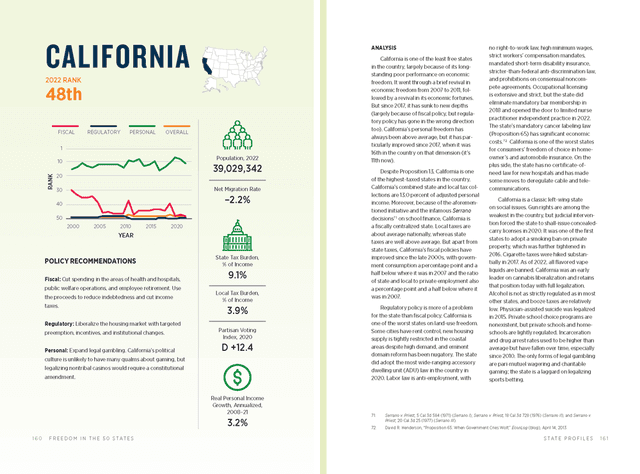Policy Recommendations
- Fiscal Cut spending in the areas of health and hospitals, public welfare operations, and employee retirement. Use the proceeds to reduce indebtedness and cut income taxes.
- Regulatory Liberalize the housing market with targeted preemption, incentives, and institutional changes.
- Personal Expand legal gambling. California’s political culture is unlikely to have many qualms about gaming, but legalizing nontribal casinos would require a constitutional amendment.
Analysis
California is one of the least free states in the country, largely because of its long-standing poor performance on economic freedom. It went through a brief revival in economic freedom from 2007 to 2011, followed by a revival in its economic fortunes. But since 2017, it has sunk to new depths (largely because of fiscal policy, but regulatory policy has gone in the wrong direction too). California’s personal freedom has always been above average, but it has particularly improved since 2017, when it was 16th in the country on that dimension (it’s 11th now).
Despite Proposition 13, California is one of the highest-taxed states in the country. California’s combined state and local tax collections are 13.0 percent of adjusted personal income. Moreover, because of the aforementioned initiative and the infamous Serrano decisions on school finance, California is a fiscally centralized state. Local taxes are about average nationally, whereas state taxes are well above average. But apart from state taxes, California’s fiscal policies have improved since the late 2000s, with government consumption a percentage point and a half below where it was in 2007 and the ratio of state and local to private employment also a percentage point and a half below where it was in 2007.
Regulatory policy is more of a problem for the state than fiscal policy. California is one of the worst states on land-use freedom. Some cities have rent control, new housing supply is tightly restricted in the coastal areas despite high demand, and eminent domain reform has been nugatory. The state did adopt the most wide-ranging accessory dwelling unit (ADU) law in the country in 2020. Labor law is anti-employment, with no right-to-work law, high minimum wages, strict workers’ compensation mandates, mandated short-term disability insurance, stricter-than-federal anti-discrimination law, and prohibitions on consensual noncompete agreements. Occupational licensing is extensive and strict, but the state did eliminate mandatory bar membership in 2018 and opened the door to limited nurse practitioner independent practice in 2022. The state’s mandatory cancer labeling law (Proposition 65) has significant economic costs. California is one of the worst states for consumers’ freedom of choice in homeowner’s and automobile insurance. On the plus side, the state has no certificate-of-need law for new hospitals and has made some moves to deregulate cable and telecommunications.
California is a classic left-wing state on social issues. Gun rights are among the weakest in the country, but judicial intervention forced the state to shall-issue concealed-carry licenses in 2020. It was one of the first states to adopt a smoking ban on private property, which was further tightened in 2016. Cigarette taxes were hiked substantially in 2017. As of 2022, all flavored vape liquids are banned. California was an early leader on cannabis liberalization and retains that position today with full legalization. Alcohol is not as strictly regulated as in most other states, and booze taxes are relatively low. Physician-assisted suicide was legalized in 2015. Private school choice programs are nonexistent, but private schools and homeschools are lightly regulated. Incarceration and drug arrest rates used to be higher than average but have fallen over time, especially since 2010. The only forms of legal gambling are pari-mutuel wagering and charitable gaming; the state is a laggard on legalizing sports betting.

